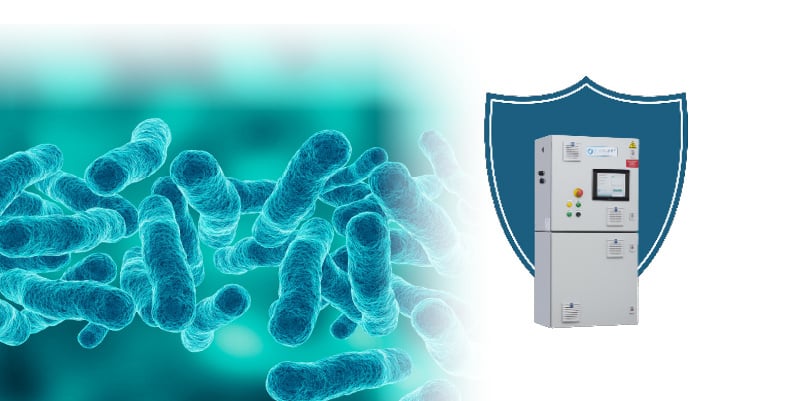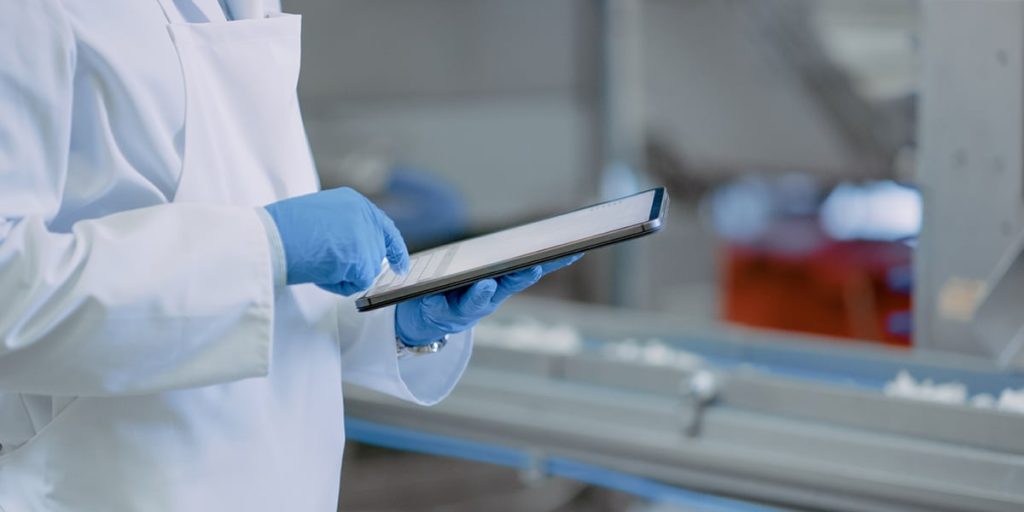The last thing that the vivarium staff wants is equipment that’s been “cleaned” but still has residue and/or pathogens present. This can create an environment that could compromise the integrity of the research or compromise the health of the animals.
With the health and safety of the animals and caretakers on the line, cleaning vivariums and ensuring they are disinfected is of the utmost importance. Vivarium managers and their teams need a reliable chemical sanitation partner who will ensure that equipment and animal quarters are properly cleaned and disinfected.
A reliable chemical sanitation partner provides holistic sanitation solutions for research success, including:
- Chemical verification
- Washer operation inspection
- Chemical dispensing equipment verification
- Inventory management
- Records retention
- Training
1. Chemical Verification
Chemical verification is important to not only the success of a biomedical research program but also the health and safety of the animals and their caretakers.
A holistic chemical verification service should include:
- Performing chemical titration of alkaline and acid rack, tunnel, cabinet, and bottle wash detergents and descalers
- Checking the neutralization of pH levels prior to wash discharge to drain
- Checking the final rinse pH
- Checking the concentration of every disinfectant proportioner
These checks ensure that the chemical component of the sanitation process is operating as it should. Without it, the husbandry team does not know if this part of the sanitation process is working properly.
This lack of knowledge can cause big issues. Operating below the target range can create an environment where pathogens can flourish, whereas overusing may result in exceeding the chemical budget while reducing the effectiveness of the lab cleaning and disinfecting program. Both ends of the spectrum can be problematic and lead to compromises in the integrity of the research and the welfare of the animals. More specifically, pH excursions up or down the scale post wash can lead to serious consequences for animal health and well-being.
2. Rack, Tunnel, and Glassware Washer Operations
It is critical to work with a partner who takes a proactive approach to inspecting washer operations. A holistic approach peels the onion beyond making sure that the chemical program is sound. Problems in washer operations can lead to:
- Unsatisfactory ATP results
- A compromise in the integrity of the research
- Potential animal health issues
- Mechanical failures that lead to washer downtime
While a chemical sanitation partner is not your mechanical contractor, they work in, on, and around mechanical washers every day. They conduct a thorough review of your washers, looking for any mechanical problems that could pose a problem. Even if the chemistry is being delivered at the proper concentration, this will not matter if the washer isn’t operating properly. Inspecting your washers for proper operation is another pillar in providing holistic sanitation solutions for research success.
A chemical sanitation partner who takes a holistic approach works to ensure that washer operations are not creating problems in cage wash. A proactive partner spots possible failure points before they become problematic.
3. Chemical Dispensing Equipment Verification
Laboratory animal facility managers should find a chemical sanitation partner who will provide all of the necessary equipment to deliver a state-of-the-art program. Your chemical sanitation partner should be an expert on the equipment in use within your facility. They should provide timely, proactive preventative maintenance, and be prepared to repair, or quickly replace, any equipment that is malfunctioning or failing.
Chemical Dispensing Equipment Verification:
- Eliminates or reduces potential costly downtime
- Reduces the need for emergency service visits
- Ensures chemistry is being delivered within the specified range
A reliable chemical sanitation partner takes a proactive approach to ensure that the chemical application and dispensing equipment is proactively and properly maintained. Regularly scheduled maintenance ensures the integrity of your research and promotes the welfare of animals while eliminating cost exposures associated with poor performance and equipment failure.
4. Records Retention
Record-keeping is an important part of the integrity of research, the welfare of animals, and the readiness for inspection and accreditation. Animal facility management needs to not only show the visual aspect of the chemical sanitation program but also the records to back up those results. A program dedicated to Holistic Sanitation Solutions For Research Success will memorialize everything they do in an electronic service report, eSR.
This goes beyond providing a record of chemical concentrations. It provides verifications and validations. Doing so enhances the integrity of the research by showing that all aspects of chemical sanitation have been thoroughly examined so as to not negatively impact results.
Keeping records also helps rule out possible causes of a pathogen outbreak. Service records show Inspectors, Accreditors, and Investigators that your facility has done its due diligence to ensure the integrity of the research being conducted while maintaining the welfare of the animals.
Failure to keep detailed service records sets a research facility up for trouble. Without these records, inspectors, accreditors, principal investigators, and government investigators won’t know for sure what best practices have kept the facility safe and what poor practices have caused problems.
A lack of detailed records also opens a facility up to being blamed for problems it didn’t cause. For example, a municipality may be concerned with problematic pH levels being fed into the wastewater system. A strong service reporting platform will provide the facility with proof that the effluent pH levels have been checked, found to be in compliance, and memorialized in the service record.
5. Inventory Management
One of the worst things that can happen to a chemical sanitation program is running out of cage wash and animal room cleaning and disinfecting products. Running out means a biomedical institution’s cleaning program is out of operation until new chemicals arrive.
To avoid this, biomedical research facilities should partner with a chemical sanitation vendor that provides the chemicals needed when they’re needed. A vendor should provide inventory management tools with predictive ordering to ensure stock never runs out. That is another pillar of a holistic sanitation solution for research success!
6. Ongoing Training
With the health and welfare of animals and employees being vitally important, ongoing training is crucial to a research facility’s success. Failure to provide proper training could result in:
- Animal injury
- Caretaker injury
- Damaged equipment
- Compromised integrity of research
- Operational inefficiencies
- Chemical waste and overspending due to lack of training
A partner dedicated to holistic sanitation solutions for research success will provide a full suite of training to include:
- Chemical safety – How to properly handle and use chemicals
- Sanitation – How to clean the vivarium properly and why it is important to do so
- Equipment – How to safely operate and maintain equipment
- Hygiene – Why personal hygiene is important in a sanitary environment
Providing proactively scheduled training closes the loop on all potential pitfalls. With regular visits from a service representative, a chemical solutions vendor is able to provide hands-on training and answer questions in real time.
Chemical Sanitation Solutions for Cleaning Vivariums
Biomedical research is vitally important for a healthy world. However, the quality of that research depends highly on the quality of a research facility’s chemical sanitation program.
By working with a partner dedicated to providing holistic sanitation solutions for research success, biomedical researchers can rest assured that their research facilities will be cleaned and disinfected effectively each and every time.
Partner With a Proactive Chemical Sanitation Provider
Rochester Midland Corporation is more than a vendor of specialty chemicals. We take a holistic approach, tailoring our service program to your specific environments. We don’t offer a one-size-fits-all solution but work with you to solve your unique problems.
RMC offers a comprehensive program to address cage wash, animal room cleaning and disinfection, environmental surveillance, and validation. Contact us today for a complimentary program survey.



